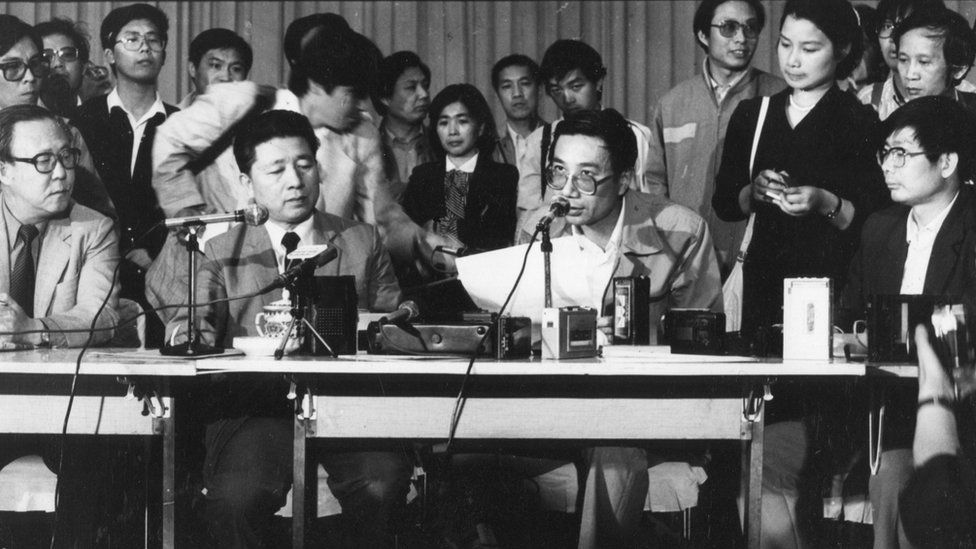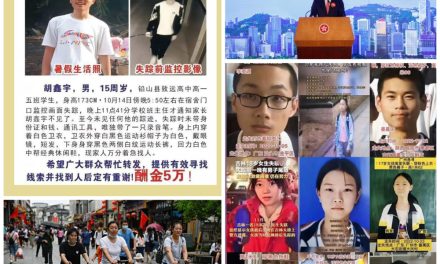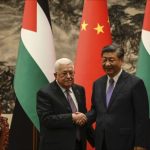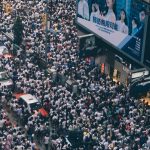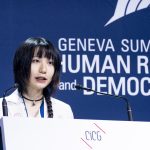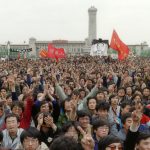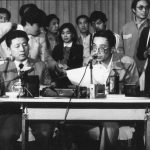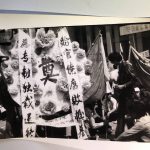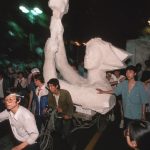By Zhou Duo
April 25, 2024
Editor’s note: what follows is another in a series of remembrances by a participant in the events leading up to the June 4, 1989 Beijing massacre. Here, the author talks about the events leading up to the visit of Mikhail Gorbachev to Beijing starting May 15, 1989. Part 1 is here , part 2 here.
Yan Mingfu made a brief opening statement. He first introduced himself, saying that he had been a student and had been a Russian translator for a long time. He had spent eight years in prison during the Cultural Revolution. Later, he became the deputy editor-in-chief of an encyclopedia, and later still became the secretary-general of the Standing Committee of the National People’s Congress. In 1985, he went to the United Front Work Department, the government channel for information transmission. On this day, some intellectuals suggested that he talk to the students.
Later, based on what his superiors had said, he affirmed the students’ patriotic enthusiasm, but opposed their actions. He called on students to take the overall situation into consideration and solve problems through dialogue and consultation, and added that the central government was sincere about dialogue. Just that afternoon, he and Zhao Ziyang, Hu Qili, and Wen Jiabao had held a dialogue with worker representatives at the invitation of the Federation of Trade Unions, and had decided to dialogue with student representatives the next Monday. Comrade Zhao Ziyang had his views. He hoped that they would be broadcast on TV soon to let the students know.
Whether Gorbachev’s visit to China could go smoothly had become a matter of concern at home and abroad. Students were planning to take action. If 20,000 to 30,000 people gathered in Tiananmen Square and even the welcoming ceremony could not be held, what would be the consequences? The students’ reasonable demands were being studied by the government and the Party Central Committee, and solutions were being studied for the current controversies. However, problems had to be solved on the track of democracy and the rule of law, and things could not be made perfect overnight. Students could have a variety of opinions, but if they did something that harmed the Sino-Soviet talks, it would definitely cause pain to friends and glee to enemies, and would not be supported by the public. He would definitely report the opinions of the students directly to the central government. Whatever he knew about the situation must be conveyed to the students candidly. If he agreed with them, he would say so, and if he disagreed, he would say that too. Students should feel free to speak their minds without any worries.
In response, the student representative Wuer Kaixi spoke first. He said: “My name is Wuer Kaixi, and everyone knows my name now.” (My scalp went numb after hearing this). “I am participating in the discussion today as one of the hunger strikers, and I am also a member of the Beijing Students’ Autonomous Federation. I think we should respond positively to Comrade Zhao Ziyang’s speech, so we are not planning to demonstrate on May 15. Everyone thinks that a hunger strike is the most peaceful way. Many people, including myself, think that our purpose is to force the government to show sincerity. Will the hunger strike continue until the 15th? Thinking about how the April 26 editorial led to the demonstration of April 27, the students’ opinion is that as long as the problem is not resolved, people will want to continue.”
“But the government’s behavior has improved, so why are the students still holding on? Because they are still worried about the government’s sincerity and the editorial. The April 27 demonstration was organized by our association. It has been a month and the government has not responded to our demands. What’s the point? Will there be demonstrations on May 15? I can only say that we should try to the extent possible to avoid them. But the root is the editorial. If the label of ‘turmoil’ is not removed, even if we don’t take to the streets when Gorbachev comes to visit we will do so in the future. The editorial said ‘these events are turmoil.’ Well, what does ‘this’ refer to, and how do you understand the word ‘events’? The demonstrations in Changsha and Xi’an were not ‘organized,’ not ‘premeditated’! Those that are ‘organized’ and ‘premeditated’ can only refer to the students in Beijing. The government must apologize and admit its mistake. Should The People’s Daily be held responsible? Journalists should make comments based on a full understanding of the truth. The newspaper only contained a few dozen words and had a cold tone. I didn’t think it was a trivial matter and this should have been placed on the front page. I fear that the news being proclaimed was not that simple, not as unambiguous, as what was said.”
Wang Dan spoke next. He said, “Zhao Ziyang seems to be very worried about Gorbachev’s actions during his visit to China. When a reporter asked him this question, he replied: ‘This is a domestic matter for us, and Gorbachev is on a state visit, so there is no need to worry.’ The accusation of unrest in the April 26 editorial must be addressed and redressed, corrected by a public apology. Otherwise, the student movement will achieve nothing, the safety of students cannot be guaranteed, and the movement will not subside. I hope to give the central government a piece of advice: a government, a ruling party, must be based on public opinion and not lose the support of the people. I hope our government will seriously consider the views of students. I can’t say more beyond this.”
The third person to speak was Ma Shaofang. He too said that the label of “turmoil” must be removed. The students on May 6 requested a dialogue, and that it be delayed until the following Monday. However, the press requested that the dialogue be arranged the next day. This was unfair. (Yan Mingfu replied that there was not a confrontational dialogue, it was rather a discussion).
Then Xiang Xiaoji spoke: “We submitted a petition on May 6. Director Zheng Youmei of the CCP’s Public Complaints and Proposals Administration contacted us on May 8th. We had called them on May 1st. Last night, comrades from this agency did come to my dormitory. I was not there, and so made an appointment. We were able to talk at 10 o’clock this morning. I was asked to submit a list of 20 representatives for the Monday dialogue. I brought it and said that we wanted the dialogue to be broadcast live to avoid the conversation being edited so as to distort the truth. We will get the news next Monday. We were not the only ones who had the conversation. We were in fact only a small part. News from Northern Jiaotong University has confirmed that Zheng Youmei said that most there were representatives of the student federation. The approach of the government caused strong dissatisfaction among the students. We demand an independent and open dialogue with the delegation. We are sincere and full of goodwill. We want to talk about three major issues: 1. The nature and background of the student movement; 2. The April 26 editorial; 3. Article 35 of the Constitution, concerning freedom of association, speech, publication, and demonstrations, and its relation to the World Economic Herald incident, the legitimacy of the Self-Advocate Alliance, and Beijing’s ten regulations on demonstrations. The comrades from the Public Complaints and Proposals Administration only responded that the responsible comrades from the central government would come forward to talk, though no details were disclosed. And so we were not opposed to the dialogue with the students to be held the next Monday. We welcome the government’s attitude, but we demand an independent and public dialogue.”
Shen Tong from the Dialogue Group said that the bicycle parade and hunger strike had taken place after the petition submitted by the students on the 5th calling for dialogue was not answered. The students were eager for such a dialogue. Many students were inspired by Comrade Ziyang’s speech before joining this dialogue group. The appearance of today’s hunger strike is not due to the date of Gorbachev’s visit on May 15, but rather because the government has never altered the term “unrest” or even its attitude.
Wu’er Kaixi asked to hear Minister Yan’s opinion, saying, “It’s taken more than twenty days for me to get today’s opportunity. It’s so precious!”
Yan Mingfu said: “I will report the students’ opinions to the central government without changing a word. Regarding dialogue, the central government has been seriously thinking about it since April 27. The underlying reason for the students’ march is that there are different levels, social and economic differences in our country, major issues in culture and education. The students’ demands for solving these problems are completely consistent with those of the central government, but the measures to be taken cannot be decided in a day or two. If we adopt a lackadaisical attitude, we will not be able to solve them. But we can agree to dialogue immediately. Our Party Central Committee and State Council are not one that agrees with or even promotes corruption. Otherwise, we would not expose corruption in the newspapers, decide to audit the five major companies, etc. But, again, a serious and authentic answer cannot be formulated in a day or two. Everyone has seen the resolution of the Standing Committee of the National People’s Congress. The National People’s Congress may agree or disagree with the State Council’s audit of the five major companies, and I do not rule out the possibility of inviting students to participate. I don’t know the view of the bureau, and I don’t think I should impose my opinions on you. Dialogue is an integral part of the democratic system.”
“The resolutions of the 13th National Congress of the Communist Party of China had never been implemented before, but you have already reflected on them. The young and middle-aged scholars here can testify to how many sleepless nights we have we spent at this table. This afternoon, representatives of large and medium-sized enterprises said that such enterprises have never previously been excited like this. There is currently a contradiction between governance and economic development. How can we solve the problems of reform of the political system, so as not to lag behind? Laws on the press, association, demonstrations…these are all being carefully prepared. The students have doubts about the sincerity of the government’s dialogue. I felt that we should first conduct a critical review of ourselves, and thus failed to convey our thoughts after April 27 to everyone in a timely manner. And I was also troubled, and how to convey this? Yesterday, Xu Simin of Hong Kong Mirror asked me my views on the current situation (Yan Mingfu repeated the relevant content of our conversation in the morning)…I think the way April 27 and May 4 was handled was successful.
The central government was indeed worried (I actually hoped we had misinterpreted the students’ wishes) that the hunger strike would affect the Sino-Soviet talks. I hoped that the students could show sufficient rationality and patriotic enthusiasm. The improvement of Sino-Soviet relations would mean we now had no enemy countries. I told Mr. Xu Simin: I am 58 years old, how many more years can I continue to work? In a few years, it will be they (referring to students) who will push reform forward, and I hope they will inherit a good legacy. However, the objective development of events often affects the results. I am not here to please you students, but the future is indeed up to you to decide. If you hope to leave a good legacy, you should restrain your behavior. The generation now in their thirties and forties will be your generation. You are destined not to be a generation that enjoys pleasure, but a generation that is concerned about the country and its people. I hope that no one will doubt the sincerity of the government.
The student representatives were silent for a time. Wang Chaohua then spoke: “I would like to make a speech on behalf of the Standing Committee of the Students’ Autonomous Federation to express our attitude. 1. The dialogue delegation was established on May 3, convened by Xiang Xiaoji and Shen Tong. We assisted in the organizational preparations. 2. These groups— the Chinese Independent Federation, the Dialogue Group, and the Hunger Strike Group — were all products of the student movement. We considered our responsibilities and mentioned the unauthorized organizations and the dialogue group several times. The establishment of the dialogue group does not necessarily require the recognition of our federation. In fact, the dialogue group represents a broader range of students. We and not the Federation of Students were invited today, which shows that the government recognizes us…”
Yan Mingfu immediately interrupted and said, “I will convey to the central government your opinions on separate dialogue and open, fair and objective reporting. I don’t know the students. We asked several teachers to invite the students they think are representative.”
Wang Chaohua then continued: “No one can represent the students, it is a spontaneous, energetic reaction. The National Committee of the Federation of Independent Colleges and Universities met on the 9th. Representatives from more than 20 universities were in attendance. Today’s hunger strike by itself, with almost no notice, attracted more than 40 people. We were willing to cooperate and agree with Comrade Ziyang, but we could not control the students’ emotions. Had the military and police not been dispatched on April 20, we could have had a dialogue on April 21. If you hadn’t published the editorial on April 26 and then engaged in that fraudulent dialogue, directed by officials, on April 29, the student movement could have been calmed down. This is an important reason why the government has been wiser since May 4. Why then was there still a hunger strike? Because the term ‘unrest’ had not been changed, the students were deeply worried. Decades of class struggle had made them have to worry about settling of accounts after this is over. Students from other places still dared not tell their families. We should put them in position to say they participated in the patriotic democratic movement, otherwise the students would still be unable to stand up. We should hope to enable them to make a clear statement on the editorial.”
Later, Shao Jiang said that they conducted a public opinion poll among students, and 90% of them distrusted the official government, 82% asked to withdraw from the official student union, and 80% supported the student-led government.
Sun Liping, Liu Xiaobo, Min Qi and others spoke one after another, though the conversation became less and less focused. The general idea of Xiaobo’s speech was that compared with students, intellectuals should feel ashamed, should repent for their lack of courage to act.
Li Su was a little anxious and repeatedly urged me to speak on behalf of him and Zheng Yefu to bring the meeting to its main topic: how to solve the current situation. I had to speak, and said: “I would like to say a few words on behalf of myself, Li Su and Zheng Yefu. Of course we each have our own opinions on and evaluations of the current situation, but we are not here to talk about them today. Today our concern is the students. We came here to mediate the conflict between them and the government. Let us work together to find a way to calm down the situation that both parties can accept. Because there are some people on both sides who are unwilling to calm the situation down, we must find a way to persuade them. I apologize, perhaps my consciousness or my own role is too strong, but since the three of us have played such a role today, we have to make two points for the students’ reference. Or do you merely want to show strength? First, I think that both sides have done that sufficiently already. It is time to sit down and seriously discuss ways to solve the problem. Second, in order to solve the problem, both sides must have a sense of compromise and learn to make suitable decisions, to concede on some points. Both opposing parties should first put themselves in the other party’s shoes, understand the other party’s situation, the possible reactions of various people on his own side, and the balance of power, and then put forward conditions that the other party can accept. The consciousness of compromise is the consciousness of playing chess — every time you make a move, you must think twice about the opponent’s possible countermoves. It is obvious that no one can adopt this move, because this move will insure your complete defeat. You can’t expect the other side to act like you suppose. After all, this game is played by two parties, and no one can control the other.”
Li Su tried to explain the issue more clearly. I was a little worried for Yan Mingfu after hearing him say: “Who represents the students and who represents the central government? There are also different views in the central government on the April 26 editorial. In the [World Economic] Herald there are two opinion factions: the pessimistic faction believes that it is too late to do anything; the other faction believes that we must rely on the positive forces within the party.”
Sun Liping also expressed his opinion, believing that the key to the problem was to properly evaluate the student movement. He made several suggestions. First, whether Deng Xiaoping or others could make a positive comment about the students during the meeting with Gorbachev. Second, the People’s Daily must take some action on the influence of the April 26 editorial. Third, we must solve the problem of “ex post settlement of accounts.” Sun believed that the student movement has shown signs of dealing with any aftermath. Can the central government provide certain guarantees? Don’t make any moves suggesting you want primarily to “catch the bad guys.”
Members of several student representatives then spoke, and said that the three key points were: 1. The label of “turmoil” must be removed; 2. The “Support Alliance” must be recognized as legitimate; 3. The dialogue must be equal. In order to calm the situation, there must be a clear answer to the editorial’s characterization by May 15th. The dialogue between the government and the student federation is best postponed.
Liang Number Two (Liang Qingdun) then said, “Who controls the situation? The students control it themselves. The majority of students are waiting in the square for the government’s stance. I don’t think anyone can guarantee that conflict will not occur on May 15.”
Li Su wanted to talk specifically about the nuts and bolts of how to do these things. He asked the student representatives, “If the government does not need to deny the April 26 editorial, but affirms Zhao Ziyang’s speech, will this work? You want to add 20 people to the quota for dialogue. Can we reduce it a tad?” Wang Dan rejected this suggestion. He said: “The government must definitely admit its mistakes publicly, because the government has in the past always been brave enough to do so.” (Everyone laughed.) “If we want to add 20 representatives, they must be elected through universal suffrage, and there is no time.” Wuer Kaixi agreed: “Ten thousand steps backward, why can’t the government admit its mistake? Why can’t it have a specific dialogue?”
Yan Mingfu saw the emotions in the meeting getting out of hand, and had to express his position: “First of all, I would like to thank so many students for coming to the United Front Work Department. Regardless of the outcome of the exchange of opinions, we should remember the atmosphere of goodwill today. Second, if there is time, I will report to the Central Committee tonight. Third, it is difficult to overturn the April 26 editorial. I hope that more experience will allow all participants to understand the nature of the student movement (referring to Wang Chaohua). It is difficult to reach any agreement. I hope that the students will end the hunger strike before Gorbachev’s visit and prove that their movement is righteous. I am afraid that it will be difficult for us to control the outcome of the situation. The students of the hunger-strike group who showed fearless spirit called for a calm, fair and positive response to Comrade Zhao Ziyang’s speech. Fourth, I think there is no basis to distinguish between reformists and conservatives at this level. Few people wear Chairman Mao badges now, though I have heard that some people in the party disapprove of the line that has been adopted for the past ten years. However, since I entered the Central Committee, I think there is no basis for thinking that the Central Committee is divided into reformists and conservatives. In an open society, all of us will see values for and ways of thinking about change. I hope it will not lead to a complete regression. Personally, I am in favor of separate dialogue between some leaders and representatives elected by the students. It is not demanding to report the dialogue objectively, fairly and openly. But as a walk-on, I cannot go beyond the beat of the music. And yet, I will try my best to express my opinions and promote what I think is a reasonable request. It is difficult to repudiate the editorial on the 26th at this time. I hope you will secure this right, but before Gorbachev’s visit, you can act rationally to show that your request is correct, just like the one on April 27th. Such actions will win praise from society. At present, the desire of both parties to understand each other is very important.”
After hearing these words, the student representatives were silent for a while, but obviously did not understand. Shao Jiang then said, “Both of us have adopted a tolerant and restrained attitude, but the students may not be satisfied with the requests made by Minister Yan.” Yan Mingfu asked kindly, “But do you think that attitude is, as the saying goes, seeking truth from facts?” Wuer Kaixi interjected, saying, “I always feel that the government has the rebellious mentality of a child!” I said to him, “I am sorry, I think you should distinguish between the different people in the ‘government.’ Is it Yan Mingfu who evinces a ‘rebellious mentality’? Zhao Ziyang? Or someone else?” Yan Mingfu then said: “I think dialogue is not itself a way to solve the problem, but a channel for communicating information. On the matter of the April 26 editorial, one or two conversations won’t solve it.”
I could see that the conversation had basically made no progress. The students seemed to be basically unaware of the profound implications of Yan Mingfu’s speech. They had to take the microphone to say a few words. When Wang Chaohua saw that I wanted to speak, he shouted to stop others, and said, “Everyone, be quiet and listen to Master Zhou!” I then said, “I would like to provide some reference points for the students. First, should students learn to understand diplomacy? The real meaning behind the rhetoric? I think this occasion should be a good learning opportunity for you. Students should take advantage of these opportunities to mature as quickly as possible. Second, I don’t think you have to worry too much about the settling of accounts after this is over. The world is changing very fast, and it is quite possible that those who want to settle accounts are just engaged in wishful thinking. Security does not lie in a piece of paper or a few promises, but in your own actual strength. Only by winning widespread sympathy and support from all walks of life can you gain strength. Third, in fact, you have become the government’s negotiating opponent. No one can deny this objective fact. Now, the two sides are playing cards, and the question is how to play them wisely. Being smart depends on whether you have a clear head. I think the most important thing now is to figure out whom you are engaged with. Both parties are constrained, and need to have cards in their hands to convince themselves (not the other party). There may be a group of people behind the scenes who may not want to calm the situation down. I think this is the key to the problem.”
Liu Xiaobo obviously understood the implications of my words. He said, “I think Minister Yan Mingfu is very sincere… (Yan immediately interrupted with a smile and said: “Don’t stir it up again!”). Xiaobo continued, “I think conditions should be created to have central leaders with a positive attitude.”
Li Su said it more clearly: “The Political Bureau of the Central Committee did not recognize Zhao’s speech, and it was not a collective decision.” (Yan Mingfu then said with a smile: “Did you participate in the Politburo meeting?”)
Wang Juntao had remained silent before, but seeing that it was almost midnight, he finally spoke. “Minister Yan, frankly speaking, you moved the mountain with your words. Zhou Duo and I are old friends, and I know him and others very well. Originally, they were not enthusiastic about helping with this. Several people have been very moved by you here today. Today, students appear to be more mature than the government. Their demands have been reduced to a minimum, to almost nothing. There are only technical matters now; can we get through May 15th? The government should fully learn from this and make arrangements. What strategic arrangements has the party made thus far? What will modernization rely on? Intellectuals, entrepreneurs, and civil servants must reflect on our modernization model. Merely getting through this is not necessarily a good thing.” (Yan Mingfu objected: “This is wrong! Everyone’s heart is very heavy.”) Minister Yan did indeed move the mountain and moved the students, but if the students here gave in, it would be impossible for them to represent students as a whole.
Upon hearing these words, Yan Mingfu seemed to be very emotional, but also a little tired and disappointed. He repeated his conclusion: “Students will only talk about Yan Mingfu’s opinion when they go back today. Of course, they don’t necessarily agree with it. I hope that the students will show the greatest rationality and provide more support for their characterization of things. There is a second point, which is that the development of the situation does not depend on our will. I have promised to report to the central government truthfully. If I did not, I would not be a responsible official! Third, I will try my best to promote the selection of relevant personnel and students, and dialogue between the delegations. Fourth, I completely agree with the analysis of esteemed others just now. Regarding any settlement of accounts after this is over, I will work as an intermediary, a translator of sorts, as I am here today. I will use the strongest tone to convey the students’ expressions truthfully.”
Wuer Kaixi immediately suggested, “Time is running short, can we keep going?” Wang Dan then added, “Our hunger-strike group has room for leeway. We did not deliberately choose a date before May 15th.” Yan Mingfu stared and said, “I hope that’s not just your personal view!” Wang Dan replied: “I represent the opinions of my fellow students.”
Yan Mingfu finally concluded strongly, “It will be impossible to overturn the verdict on the editorial in just a few days. Don’t have any misunderstandings about this. The request cannot be expressed in that nakedly blunt way.”
It was past midnight when the meeting ended. Tao Siliang said that the United Front Work Department had prepared some simple midnight snacks, and everyone was welcome to have some. I was extremely depressed. If I had known that this would be the result, I really wouldn’t have said anything. But I was not willing to give in. After all, these four or five hours had had some effect on the students. Their attitude was no longer so rigid. I took advantage of the situation to take Wang Dan and other key figures aside and began to make my final attempt to persuade them. The main idea was that in my opinion, they lacked a clear understanding of a key issue. It was a role reversal. It turns out that whether you march, put up big-character posters, or shout slogans, they are all simply expressions of opinions. You are expressing the political aspirations of young students. But it’s different here and now. You have now put forward clear conditions, backed by a certain strength, and asked the government to accept them. In this way, you no longer express opinions, but become representatives of real political forces. You have become deeply involved in politics and have become negotiating opponents of the government. You must recognize this transformation, and consciously improve your political strategy as soon as possible. Whether you like it or not, in fact you are already playing politics. And there is nothing scarier than being a lay politician. Now that you are involved in politics, you must do your best to play it to your advantage, and you cannot adopt a rash attitude. If you can withdraw before Gorbachev’s visit to China, you will have done a great service. First of all, this will do a great favor to the reformists within the party, tilting the balance of political power toward the moderate line. Second, you can win widespread praise from all walks of life, and win everyone’s respect for your skill in political strategy. Otherwise, if the trouble continues without restraint, you will gradually lose social sympathy. Third, if you withdraw, and then the government does not agree to your request, you can come back in at any time. The ability to move forward and retreat freely, to release and to retract as you think best, this ability to act as one is your main source of strength. Go back tonight to mobilize your classmates, and withdraw tomorrow! Even if it’s just for a few days! And my advice went on along these lines.
Wang Dan and others were finally convinced, and made up their minds to mobilize and withdraw. I was very happy to hear this, and immediately asked him how confident he was. He thought about it and said he was about 70 to 80 percent sure. I sent them off and immediately asked Tao Siliang to tell Yan Mingfu.
I don’t remember when exactly, but at some point, Zhang Gang also came. He was very proud and said to Tao Siliang, what is the situation? And how did you do handle things? Tao Siliang replied with a smile, “I really didn’t expect things to be handled so masterfully.” I joked that this is what is known as Sitong effectiveness! Then, I went to chat with Liu Yandong for a few words. She was a school friend of mine and graduated from the High School affiliated with Tsinghua University — though not in the same class; she was much older than I.
The United Front sent a car to take us home, but Liu Xiaobo changed his mind halfway back and said no, he wanted to go back to the square, and asked me if I wanted to go too. I said, “Forget it, I’m almost exhausted.” It was already past two o’clock when I got home, so I fell asleep and didn’t get up until the afternoon of the next day. It is very possible that a great opportunity had been missed. Liu Xiaobo later complained to me again and again, “Why didn’t you go to the square to persuade the students that night (the night of the 13th)? If many people like you and I had mobilized and worked together to go to there and persuade the students, it would have been entirely possible for them to withdraw.” He said that he had been doing just that, and every group of students he talked with had been convinced by it. There were about seven or eight groups in total. Xiaobo’s judgment may or may not have been right. But you can’t just say it was absolutely mistaken. I believed there would be opportunities like this later, maybe more than one or two. I don’t believe in absolute inevitability. If that were the case, life would be too boring. If people are like machines and only go on robotically, step by step, according to some programmed “historical inevitability,” then it’s really better to find a rope and hang yourself immediately.
May 14th was Sunday, so I disconnected the phone (I installed a switch on the phone line) and slept until the afternoon. Later, I heard from Tao Siliang that she had people desperately calling me all morning, trying to get me to attend the dialogue that day. I can’t say whether it would have made any difference whether I went or not. Dialogue itself could not have fundamentally solved the problem. Possibly if I and other intellectuals had adopted an extremely positive attitude that we had to do something, and then done it, trying anything and everything over and over again until success, persevered exhaustively throughout, maybe the outcome would have been very different. If you work hard on something, or do it with an attitude of “just give it a shot,” the result is often very different. The problem is that none of us were working hard like that!
After waking up, I wanted to find out whether Wang Dan had kept his promise and withdrawn from the square. But when I called the United Front Work Department, no one answered. After dinner, I suddenly had the urge to visit my mentor, Mr. Yu Guangyuan. I guessed that the leader of the students who had caused the “December 9th riots” [referring to a movement in the mid-1930s] must have some thoughts on the current situation. Besides, I hadn’t seen the old man for a long time, the last time being in October 1988. He had at that time asked me to go to Hangzhou with him to hold a seminar. I hadn’t seen him a single time since then — I feel ashamed to say it. I was obsessed with the philosophy of science at that time, and I got a headache whenever I heard other people mention the word “dialectics.” Although I finally finished reading Das Kapital, I still have lingering fears when I think about it, and I can only hope I will never again read this kind of Hegelian work in this life. Whenever I have subsequently gotten the chance, I have scolded Hegel as a bunch of nonsense, pure rubbish. Because of this, the Graduate School of the Chinese Academy of Social Sciences under the control of Deng Liqun had at one point wanted to expel me. Fortunately, the old man (that’s what we all called Master Guangyuan behind his back — I have to admit that I was the instigator) loved talent so much whenever and wherever he saw it, and always protected it in every possible way. So I managed to survive until graduation.
Going a step further, let’s talk about May 14. I first called my younger friend Liu Shiding at “Yu Ban” (Yu Guangyuan’s office) and asked him to go with and help me. That night at my mentor’s house, I talked a lot about how the Chinese Communist Party should have a Yeltsin-like figure who dared to stand up and openly confront conservative forces. Master Yu must have thought I was extremely naive. He talked a lot about his experience during the December 9 episode. Later, I got into an argument with him on the topic of the fate and role of Marxism in contemporary times. The old man and I argued until we were blue in the face. Later, Yu Xiaoqing (his youngest daughter) said: “In this home we are all obedient yes-men, and yet here you dare to contradict him like this.” I really didn’t know what to say.
It was already past ten o’clock when I came out of Master Guangyuan’s house. When Liu Shiding and I arrived at Tiananmen Square, we started to squeeze in. I took out my business card and asked the pickets to pass it along inside and to talk to Wang Dan. I waited for a full eighteen hours before I was allowed in. But Liu Shiding was kept outside. After finally finding Wang Dan, I asked him why he didn’t keep his promise. Why didn’t he withdraw? He replied that none of the students had agreed to withdraw. He told me that more than a dozen well-known people from intellectual circles had come in the afternoon, including Yan Jiaqi, Bao Zunxin, Dai Qing, Su Xiaokang…but the students could not be persuaded despite many attempts. He expressed his helplessness. I squatted in the crowd of students for a long time, scolding these student “leaders” who had neither leadership nor support, and left in dismay.
On May 15th, I went to the Party School of the Municipal Party Committee to give a public-relations lesson to the second training class of the Personnel Bureau in the morning, and in the evening the company’s fifth-anniversary reception was held. It was a fifty-table banquet held in the west hall of the Beijing Hotel, priced at 500 yuan per table. One-third of the space was empty, the scene was deserted and spiritless, very different from previous years. Then, there was the wonderful scene on May 16th.
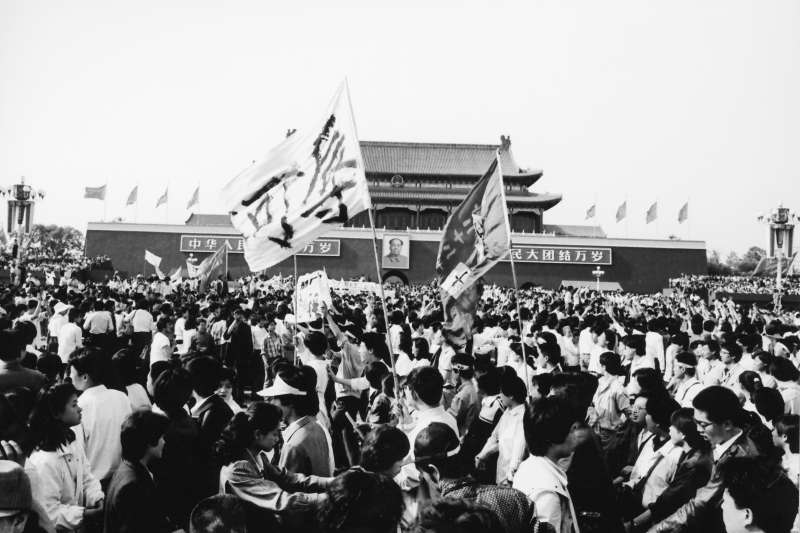
This piece was translated from Yibao Chinese. If republished, please be sure to add the source and link https://www.yibao.net/?p=247827&preview=true before the text when reposting.

